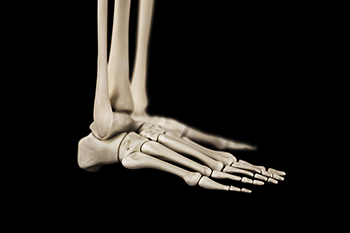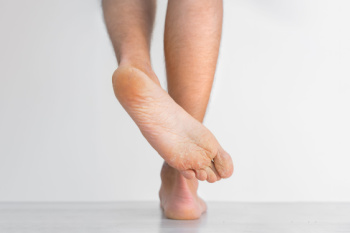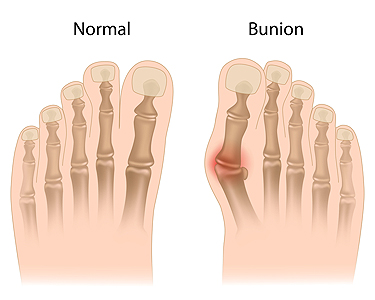Connect With Us
Blog

Foot and ankle anatomy plays a vital role in movement, balance, and daily comfort. The structure includes joints, tarsal bones, metatarsals, and phalanges that work together to support body weight and allow smooth motion. Ligaments connect these bones and help create stability by guiding proper alignment during walking and standing. When an imbalance occurs, stress may be placed on certain joints or tissues, leading to foot pain, inflammation, or difficulty with mobility. Problems such as heel pain, arch strain, and joint discomfort can develop over time. If you have foot pain, it is suggested that you consult a podiatrist who can assess foot structure, identify imbalance, and provide treatment options such as custom orthotics, supportive care, or other targeted treatments.
If you have any concerns about your feet, contact Nadia Sadeghi, DPM from Lincoln Park Foot and Ankle Specialists. Our doctor can provide the care you need to keep you pain-free and on your feet.
Biomechanics in Podiatry
Podiatric biomechanics is a particular sector of specialty podiatry with licensed practitioners who are trained to diagnose and treat conditions affecting the foot, ankle and lower leg. Biomechanics deals with the forces that act against the body, causing an interference with the biological structures. It focuses on the movement of the ankle, the foot and the forces that interact with them.
A History of Biomechanics
- Biomechanics dates back to the BC era in Egypt where evidence of professional foot care has been recorded.
- In 1974, biomechanics gained a higher profile from the studies of Merton Root, who claimed that by changing or controlling the forces between the ankle and the foot, corrections or conditions could be implemented to gain strength and coordination in the area.
Modern technological improvements are based on past theories and therapeutic processes that provide a better understanding of podiatric concepts for biomechanics. Computers can provide accurate information about the forces and patterns of the feet and lower legs.
Understanding biomechanics of the feet can help improve and eliminate pain, stopping further stress to the foot.
If you have any questions please feel free to contact our office located in Chicago, IL . We offer the newest diagnostic and treatment technologies for all your foot and ankle needs.

Athlete’s foot is a fungal infection that commonly affects the skin between the toes and the soles of the feet. Unlike ordinary dry skin, athlete’s foot is contagious and can cause itching, burning, redness, cracking, peeling, and blisters. The infection often develops in warm, moist environments such as shoes, locker rooms, or near swimming pools. Causes include exposure to the fungus, poor foot hygiene, sweaty feet, and wearing tight or non-breathable footwear. A podiatrist can accurately diagnose athlete’s foot, differentiate it from dry skin or other skin conditions, and recommend antifungal treatments, proper foot care, and preventive measures. If you notice persistent itching, redness, or peeling between your toes, it is suggested that you schedule an appointment with a podiatrist for effective relief and treatment solutions.
Athlete’s foot is an inconvenient condition that can be easily reduced with the proper treatment. If you have any concerns about your feet and ankles, contact Nadia Sadeghi, DPM from Lincoln Park Foot and Ankle Specialists. Our doctor will treat your foot and ankle needs.
Athlete’s Foot: The Sole Story
Athlete's foot, also known as tinea pedis, can be an extremely contagious foot infection. It is commonly contracted in public changing areas and bathrooms, dormitory style living quarters, around locker rooms and public swimming pools, or anywhere your feet often come into contact with other people.
Solutions to Combat Athlete’s Foot
- Hydrate your feet by using lotion
- Exfoliate
- Buff off nails
- Use of anti-fungal products
- Examine your feet and visit your doctor if any suspicious blisters or cuts develop
Athlete’s foot can cause many irritating symptoms such as dry and flaking skin, itching, and redness. Some more severe symptoms can include bleeding and cracked skin, intense itching and burning, and even pain when walking. In the worst cases, Athlete’s foot can cause blistering as well. Speak to your podiatrist for a better understanding of the different causes of Athlete’s foot, as well as help in determining which treatment options are best for you.
If you have any questions please feel free to contact our office located in Chicago, IL . We offer the newest diagnostic and treatment technologies for all your foot and ankle needs.

A bunion is a bony area that develops at the base of the big toe when the joint becomes misaligned. This condition causes the big toe to shift toward the smaller toes, leading to visible deformity and discomfort. Risk factors include genetics, wearing improper footwear, foot structure, and repetitive stress on the forefoot. Common symptoms include pain and soreness around the joint, numbness or burning sensations, redness, and swelling. Many people notice a painful bump at the base of the affected toe that worsens with walking or wearing tight shoes. A podiatrist can help by evaluating foot alignment and determining the severity of the bunion. Treatment options may include footwear recommendations, padding, orthotics, and pain management strategies. If bunion pain or irritation is affecting your mobility or quality of life, it is suggested that you consult a podiatrist who can offer effective relief and treatment solutions.
If you are suffering from bunion pain, contact Nadia Sadeghi, DPM of Lincoln Park Foot and Ankle Specialists. Our doctor can provide the care you need to keep you pain-free and on your feet.
What Is a Bunion?
Bunions are painful bony bumps that usually develop on the inside of the foot at the joint of the big toe. As the deformity increases over time, it may become painful to walk and wear shoes. Women are more likely to exacerbate existing bunions since they often wear tight, narrow shoes that shift their toes together. Bunion pain can be relieved by wearing wider shoes with enough room for the toes.
Causes
- Genetics – some people inherit feet that are more prone to bunion development
- Inflammatory Conditions - rheumatoid arthritis and polio may cause bunion development
Symptoms
- Redness and inflammation
- Pain and tenderness
- Callus or corns on the bump
- Restricted motion in the big toe
In order to diagnose your bunion, your podiatrist may ask about your medical history, symptoms, and general health. Your doctor might also order an x-ray to take a closer look at your feet. Nonsurgical treatment options include orthotics, padding, icing, changes in footwear, and medication. If nonsurgical treatments don’t alleviate your bunion pain, surgery may be necessary.
If you have any questions, please feel free to contact our office located in Chicago, IL . We offer the newest diagnostic and treatment technologies for all your foot care needs.

